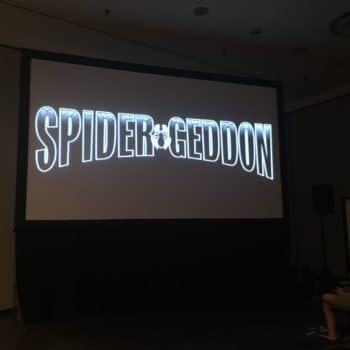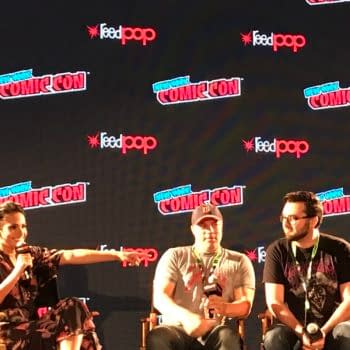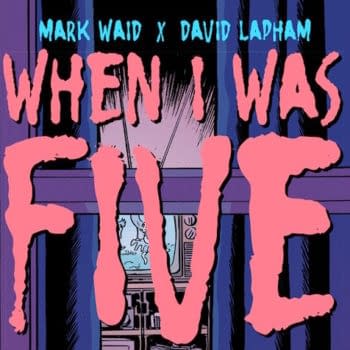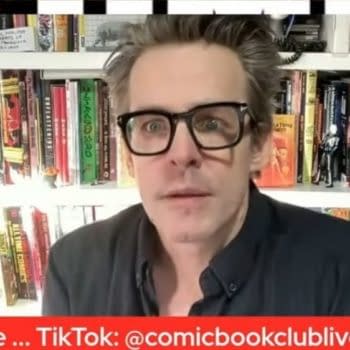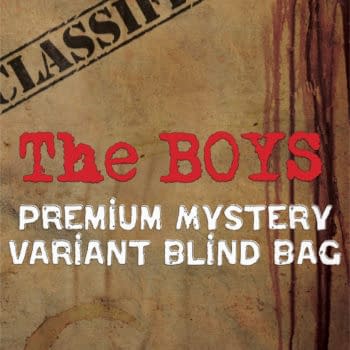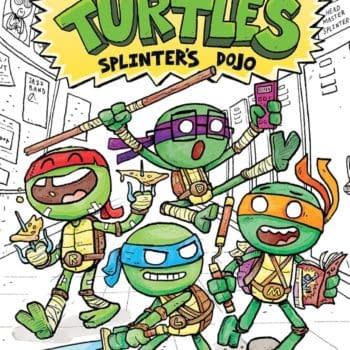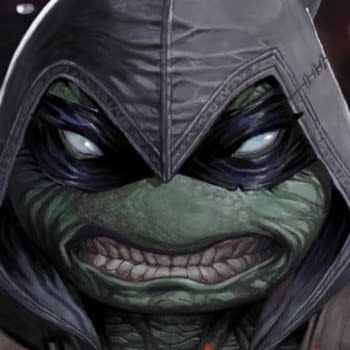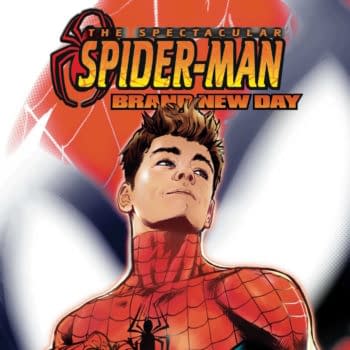Posted in: Comics, Recent Updates | Tagged: american gods, Dragonzord, Frank Lloyd Wright, Hendry Prasetya, House on the Rocks, kyle higgins, Mighty Morphin, mighty morphin power rangers, neil gaiman, power rangers
Talking Power Rangers With Kyle Higgins
When I was five or six years old a friend of mine introduced me to Mighty Morphin Power Rangers. From there, I was hooked. Coming onto the scene back in 1993, Power Rangers changed pop culture forever. There hadn't been much like it on American television, minus Voltron and one or two other shows, but Power Rangers blew up in an unprecedented way; everything that followed felt like cheap imitations. Power Rangers shaped the childhoods of many a kids, becoming a beast of a brand, recognizable worldwide. To this day, the nostalgia and affection I maintain for Mighty Morphin Power Rangers knows no bounds. Even though countless iterations have followed, Mighty Morphin was the first, an in my opinion, the best.
Recently, I spoke to Kyle about his current run on Boom! Studio's Mighty Morphin Power Rangers comic book series; if you're not reading it, you're missing out. With the movie rapidly approaching and Power Rangers becoming "popular" and "cool" again, there couldn't have been a better time to chat.
Octavio Karbank: How did you get on the Power Rangers book?
Kyle Higgins: The quick version is that Bryce Carlson, who is a managing editor over at Boom! has been a good friend of mine for years and we'd been talking several years ago about how cool it would be to do a modern version of Power Rangers. A few years later, I saw the press release that everyone else saw about Boom! acquiring the license and that we were going to do the book. I emailed Bryce and asked how I can make a pitch for the book and they actually said they were considering me already. I was just about to go shoot a film, the first thing I'd directed in a few years, and I saw that I had a window in my schedule. So I put something together and told them the direction I was going. I just put together what I thought would be a fun book, not only to write, but to read. Once I figured out the starting point with Tommy joining the team, but still playing the Manchurian Candidate aspect of his PTSD, that really unlocked a lot of doors for me. The second I figured that out I knew how to do the book. Luckily, not only did Boom! like the pitch, but Saban also really dug it.
OK: Have you always been a Power Rangers fan?
KH: I was a Power Rangers fan when I was kid, when I was about eight, and I watched all of season one. I will also forever associate Power Rangers with Neil Gaiman. We took a vacation to House on the Rocks, which is a Frank Lloyd Wright house, which is featured in American Gods and there's a museum of the strange at the end of it with a big carousal; I went to this place and we ended up in a toy store with Power Rangers figures. This was the era where the toys were impossible to find. Turns out, they had the Thunderzord toys, but they hadn't aired yet on TV so I was wondering what this was. I used my allowance money to buy two toys and when I got home. I had set the VCR to record before I left and I came home and it was The Mutiny, the first episode of season two. For me, House on the Rocks is associated with Neil Gaiman, but also with Power Rangers; the two are weirdly linked in my mind. I watched the first half of season two, but it kind of petered off for me once school started up again. So while I kind of fell off it I still kept an eye out for it, going to see the movie; I also watched some episodes of Zeo and Turbo. Fast forward over a decade and I started writing comics full time in 2011 and meeting people who still liked Power Rangers re-sparked my interest. I think as we get older, we're constantly looking at things that made us happy as a kid and it's that feeling of innocence and simpler times. That's what the last couple of years of my career have been: capitalizing on my childhood. I did Batman Beyond because I was a huge DC Animated fan. I took Power Rangers because it was a property that was really important to me as a kid. The only thing I haven't touched is Teenage Mutant Ninja Turtles, which is the other seismic thing from my childhood. As long as you don't get lost in the nostalgia or the fan service of it, there's nothing wrong with re-exploring your childhood. You just have to careful that you are bringing something new to the table and not retreading old ground.
OK: This might be off topic, but I remember the idea of the To Be Continued as being a big deal.
KH: Not at all! The way I describe what I'm doing on the book is that I'm not doing Power Rangers as they existed. I'm not even writing the Power Rangers as I remember them; I'm writing the Power Rangers as I remember them making me feel. As an eight-year old the cliffhangers, the stakes, and the mythology, were huge. Tommy losing his powers…oh my god. It was seismic! Zedd showing up…it was huge. It was epic. That's the feeling I want with the book. We're not constrained with budget. You go back to the original show, it holds up in some ways and in some ways it doesn't. I didn't want to do the book as a 90s nostalgia book. I didn't want to do it as lost episodes of the show. I wanted to take the core concept of Power Rangers and what makes them great, accessible, and empowering. I wanted to translate that to now and use the strengths of the monthly comics format to explore that stuff and exploit it.
OK: What then do you think is the core concept of Power Rangers?
KH: That we're better together. It's inclusion. Power Rangers is about inclusion and the power of friendship and teamwork. Like, they literally have to build a robot from their separate pieces in order to defeat the bad guy. That's every episode. I like to look at it from the standpoint of what it's actually saying about the concept and these characters: that we're better together. Exploring it through the lens of Tommy, a new person joining the team, was really interesting to me. I don't care how great a team looks on paper. Every LeBron James basketball team in the last five years struggles with the first half of the season. Everyone feels each other out and gets to know each other. That's really the underpinnings of the books; it's Tommy learning to be a team player and the team learning to embrace Tommy.
OK: Can you discuss writing the team dynamic?
KH: Everyone has their own voice. It's more like I don't know how to write a character's voice and more I know how not to write it. I know if someone wouldn't say something a certain way. Ultimately, I want the book to be interesting and compelling. For me it's about putting characters in situations where they have to make choices and they can interact in ways that might even surprise me.
Hold on, I have a better answer. Here it is. Writing a book like this is about unlikely partnerships. Within very group of friends there are different dynamics. If it's a group of A, B, C, and D then A and B have a relationship, A and C have a relationship and so on. All of these things are the sum total of the group, that make up the group dynamic. The thing that I've been having a lot of fun with on this book is pairing up Rangers for character moments and for small scenes that we didn't see paired up a lot. For example, Trini and Tommy. I don't think we ever saw Trini and Tommy have a one-on-one scene in the show. We get to learn more about these people based on how they play off each other. I think that's the key to writing something like this.
OK: Let's talk about how you've expanded the Power Rangers universe, from everything including the pocket dimension they train in to the relationships.
KH: To me it's about playing to the medium you're working in. The show had a lot of budget limitations. Comics don't have those limitations. I don't just want to do big action, because we can, or crazy sequences; they have to be grounded from a storytelling standpoint. Still, there are opportunities there that I would be foolish not to explore. Even setting a character moment, like the Billy/Trini scene in issue 2, in a weird place like the Dragonzord cockpit; they couldn't do that on the show. That's the stuff that gets me excited. Introducing new tech and other dimensions, stuff like that, is all stuff I try and keep in the spirit of the universe and keep it consistent with the established universe we're riffing on. I would be a hack if I weren't bringing something new to the table.
OK: What have been the most challenging and rewarding aspects of writing Power Rangers?
KH: The most rewarding is the fanbase. The established fans, the people who are very passionate about the Power Ranges; it's so much fun to meet them. I mostly hear from people who like the book. Especially with regards to Mighty Morphin, it's a fanbase that hasn't had a lot of material in a while, especially in comics. Power Rangers has never been really explored in comics. To be able to do that, along with Hendry Prasetya, my partner in crime in all this, has been rewarding. Just to have people come up and tell me that it's their favorite version of Power Rangers, that's really cool. I try not to think about that stuff too much, because you don't want to get lost down the rabbit hole of positive or negative reactions, but that's neat. The most daunting thing is that it's tricky, but also fun, to update things. It's hard to figure out what I want to use and what I don't want to use. There are certain things in the show, like the Juice Bar, that you wonder if you need. Even though it's a staple from the show, it doesn't do a lot for me from a story standpoint. Also, it's 2017 and I don't know a lot of juice bars. The Youth Center Juice Bar, where everything happens, I just didn't buy it. I wanted to worldbuild more. Some of those choices are tricky, because you don't want to do things just because the show did them, but you also don't want to not do them just because they don't resonate with you. It's about finding the note behind the note, finding what you like about something and implementing that into the book.
OK: Despite all the Power Rangers shows, people keep gravitating towards Mighty Morphin. Why do you think that is?
KH: Well, it was the first. The people who grew up with it are now our age, in their late twenties and early thirties. There's always something about the original. The original anything. That's not to take away from the other Power Rangers series; I haven't watched them but I've been told there's some good stuff in there. Still, when you think Power Rangers, you think the original core lineup. The other things to, from a visual standpoint, design for something like this is 80% of the battle. The original Zyuranger suits that Mighty Morphin use, are in my opinion, the cleanest designs of any of the Power Rangers. They're iconic. They're simple, elegant, and iconic and I think that has a lot to do with it. That translates. When you think Power Rangers, that's what comes to minds. Over the years, there have been a lot more Power Rangers, with a bunch of bells and whistles added to the suits and I can't keep them straight.
OK: Favorite Power Rangers hero and villain?
KH: That's a trap question, man! I do like Zedd a lot. I also like Scorpina a lot. The version of Rita that I've been writing I've had a lot of fun with. I love Billy, I love writing Zach…I really like them all. What I like, is writing them together; the weird pairings. Friendship is fundamental. It keeps us from true dystopia.
OK: How's it been working with Hendry?
KH: He's great! I didn't know his art beforehand, except for some stuff he did on Power Girl. Power Rangers is a tricky book to draw; it's essentially Archie with superpowers. You have to draw big, bombastic fights, but there are also quiet, intimate moments and that's tough to do. Luckily, Hendry navigates that stuff really well. Matt Herms on the colors is a godsend. The book would not look nearly as good without him. He brings it to the next level, time and again. We have a good thing going.
OK: Finally, what does the craft of storytelling mean to you?
KH: It means finding a way to say something about what it means to be human. Like, on a fundamental level. I think that's what the best writers do, or at least strive to do. Even in something like Power Rangers, the core of it is about relationships. That's something specific to humanity, the human condition and that to me is what storytelling is about. It's about finding ways to navigate and actually say something about being alive.
OK: Fantastic. Thank you.
KH: Thank you.
Octavio Karbank is a writer and bona fide Whovian. Living in Massachusetts, you can find him on Twitter @TymeHunter and his blog www.cozmicventures.com







